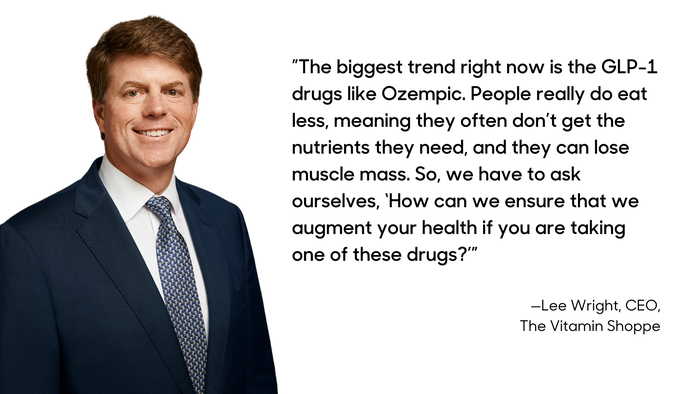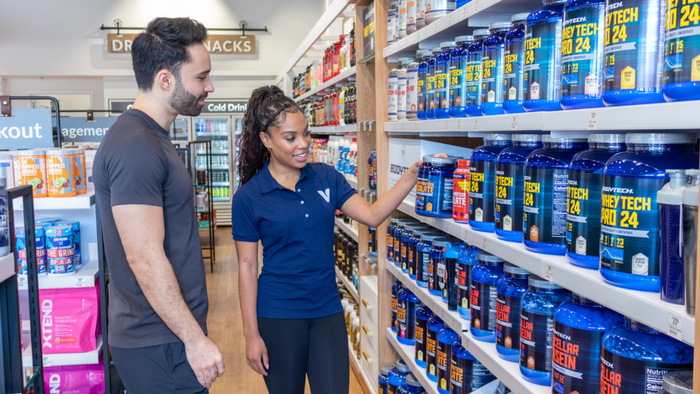The Vitamin Shoppe CEO talks challenges in today’s dietary supplement market
CEO Lee Wright shares how the retailer educates consumers, the importance of brick-and-mortar and regulatory challenges to supplements. See what he has to say.

When Lee Wright took the job of interim chief executive officer of The Vitamin Shoppe about 15 months ago, the pounds he had gained after an injury weighed on his health. His physician said he was headed for a heart attack, stroke or Type 2 diabetes, and urged Wright to take a variety of medications, including the weight loss drug Ozempic.
Wright listened to his doctor. But instead of incorporating an inventory of new pharmaceuticals into his life, he began talking to The Vitamin Shoppe’s “health enthusiasts,” the people in the wellness retail chain’s roughly 700 stores who engage with customers. And he took their advice regarding supplements and lifestyle shifts that could help ripen wellness.
When Wright in March addressed the more than 600 store managers who gathered at the company’s annual Brand Summit at a resort in Grapevine, Texas, he was a man transformed. Among other things, he was 30 pounds lighter than when he joined TVS, where in May of 2023 he was officially named chief executive officer. He’s fit and lithe today.
“My blood pressure is down immensely,” he said on a patio during a Brand Summit break. “My cholesterol is great. As a matter of fact, a friend of mine says, ‘You’re the only CEO I know who’s actually in much better health compared to when they started the job.’”
The health enthusiasts, he added, “made such a difference in my life. Coming to The Vitamin Shoppe saved my life.”
As store managers sat through presentations by nearly 60 brands about their new product launches and plans for 2024, Wright joined New Hope to talk about The Vitamin Shoppe, as well as trends impacting natural grocers today.

Those health enthusiasts were essential in your wellness journey. They must be key for The Vitamin Shoppe’s success, and not always easy to find. Health enthusiasts are working with people in seek of health assistance. They aren’t selling canned beans.
Lee Wright: We are lucky to attract people who already have a passion for wanting to help people. But we also have to ensure that we augment their education—there’s a lot to learn. We have V University and other routes toward education. We have a program where health enthusiasts submit to quizzes—and get awarded free samples if they pass. As we think about innovation being so important for us as a specialty retailer, how we differentiate ourselves from the mass, natural and online channels, the health enthusiast role’s importance grows even more important. We want to make sure our health enthusiasts really understand the new innovations and explain them to customers.
You bring up an important point: How to distinguish The Vitamin Shoppe from its many competitors, including mass channels like supermarkets that didn’t play hard in supplements until fairly recently.
LW: Health and wellness is a hot and growing industry. Everyone wants a piece of it. Our secret sauce is staying focused on our key brand pillars, which is expertise that really comes with our health enthusiasts. Larger companies like Walmart are not going to take in the new products. They’re much more followers. They like to pick from what we find, and then bring it into their stores.
Quality is also an essential differentiator. People may think they’re getting a helpful supplement or nutraceutical from other places, but it may not have any bioavailability, it may not actually even have what it says on the ingredient label. We only bring in the best products with bioavailability that have been tested. When somebody comes into one of our stores, they get all of the expertise from our health enthusiasts, but we also do live sampling on weekends, we’ll even mix samples of hydration and protein drinks for customers. We want to make sure that people feel like we are a destination where they can have a real experience. Not just pulling something off the shelf—we want them to understand the product and experience things.

The Vitamin Shoppe, which is privately owned, has stores in 44 states, the District of Columbia and Puerto Rico.
What trends excite you right now?
LW: The biggest trend right now is the GLP-1 drugs like Ozempic. People really do eat less, meaning they often don’t get the nutrients they need, and they can lose muscle mass. So, we have to ask ourselves, “How can we ensure that we augment your health if you are taking one of these drugs?” I also think gut health is so important. It’s a bit of an under-focused area, but we are certainly leaning into it at TVS because, you know, some people call it your second brain. It impacts so many things. Your mood. Brain and physical health. When someone walks into a store and says, “Hey, I just need some foundational health products,” we’ll suggest three things. A multivitamin. An omega-3 supplement for brain health. And a probiotic, and hopefully also a prebiotic and postbiotic. Another thing that has become important is nutraceuticals for women over 40. Assisting them as they go through that post-reproductive journey. It has been a very underserved area, and honestly an area that needed solutions.
Among the many demographics who shop at The Vitamin Shoppe, Gen Z may be the most challenging. They shop differently. They were born with phones. How does TVS engage with GenZ?
LW: We are technologically savvy, but we do ultimately want to get people into the stores, which is why we do things like live in-store sampling, and our dollar drink specials. It’s popular with customers and great for our brands as well, because it’s almost like paid sampling. So, there’s a lot of ways to try to drive people into the stores, but it’s a constant challenge because that generation is very phone focused. It gets back to ensuring that your physical retail provides people with experiences.
What are the biggest challenges The Vitamin Shoppe and the nutraceuticals industry faces today?
LW: We are seeing various states taking on legislative bills to prohibit the sale of any type of muscle building or weight loss nutraceutical to anyone under the age of 18. I find it very alarming.
They say the bills are aimed at protecting children against eating disorders, but I don’t believe what they are doing is actually going to solve that problem. In fact, they’re trying to restrict access [for] people who are actually trying to build muscle and have a healthy lifestyle. It could impact stores and, also, online sales. Brands will worry about delivering to addresses where somebody over the age of 18 will have to be home to accept the delivery, like with alcohol sales. It’s an extra cost that will be borne by the consumer.
I do also worry about the prevalence of obesity, and the solution they are offering here to address childhood eating disorders is unfortunately destructive. And hypocritical, too. It’s OK to go out and buy as much soda pop, chips and ultra-processed foods and there is absolutely no age limit.
Commercial real estate has been experiencing a rough patch since COVID, and before. And footprints are important for The Vitamin Shoppe. How do you navigate real estate challenges?
LW: We do see a huge and continued desire for customers to be able to order products online, which is why being an omnichannel retailer is so important. But we think as a specialty retailer, brick-and-mortar —the physical presence—allows for that direct one-on-one consultative experience that we think is so important. We think of brick-and-mortar as a potential white space right now. We are looking at and analyzing the situation, and we want to be thoughtful about it. But we now do have a franchise program, and we do have corporate stores, so we can take a thoughtful and gradual approach forward look at brick-and-mortar expansion.
Lee Wright is scheduled to speak at Newtopia Now, New Hope Network's new trade show, set for Aug. 25-28 at the Colorado Convention Center in Denver, Colorado. For more information and to register, visit www.newtopianow.com.
Read more about:
Newtopia NowAbout the Author(s)
You May Also Like




